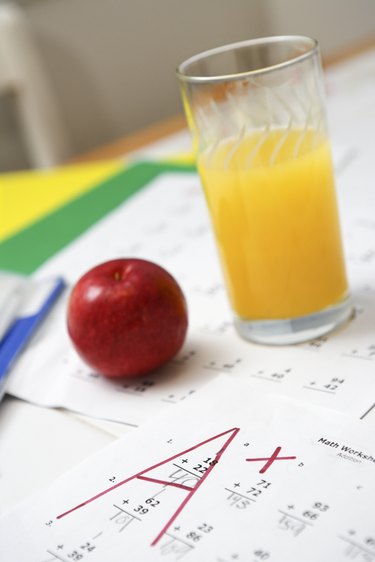
Juice diets are popular, but there are concerns that the Master Cleanse craze and other liquid diets are not healthy. So, it's necessary to clarify facts on juice diets. In particular, the health-conscious dieter will want information regarding getting protein with a juice fast. Before you start the latest juice fast fad, talk to your doctor and educate yourself on the nutritional implications of getting sufficient protein.
Protein and Juice
Video of the Day
You can get protein from juice. Getting enough protein on a juice diet is largely a matter of being mindful about what types of juices you consume. One problem, however, is that the most protein rich fruits and vegetables aren't the most appetizing -- it's hard to imagine a delicious drink made of asparagus, broccoli or cauliflower. Still, more traditional sources of juice such as strawberries, oranges, carrots, watermelon and bananas can provide adequate protein.
Video of the Day
Protein Requirements
To get enough protein, it's necessary to know how much protein is adequate. The Mayo Clinic recommends getting between 10 percent and 35 percent of your calories from protein. Given a 2,000 calorie diet, this means between 200 and 700 calories gleaned from protein, or between 50 g and 175 g of protein in your diet every day. Dates have more than 3 g of protein per serving, watermelon a little under 2 g, oranges a little over 1 g and strawberries a little under 1 g. Consult a nutritional chart to find out how much protein is in your home made juice, or read the label for nutritional information regarding store-bought juice.
Juice Vs. Whole Fruits and Vegetables
It's a myth that nutritional information is lost when converting fruits and veggies to juice, according to dietitian Katherine Zeratsky, R.D., L.D., writing for the Mayo Clinic website. While she cautions against replacing vegetables with juice in a long-term way, she says there is nothing to indicate that juiced fruits and vegetables are any less healthy or nutritious. You will get more sugar and less fiber that way, however.
Doing It Safely
To safely go on a juice fast, transition slowly from your normal diet. Eat a little less solid food each day. Don't end the diet cold turkey, either. Slowly acclimate your body to getting whole foods again. Writing for Bodybuilding.com, Randy Herring cautions juice fasters against going on a juice fast longer than a week. He does, however speak about the benefits to your health and appearance of going on a juice fast every now and again.
- Bodybuilding.com; Fasting the Juice Way; Randy Herring; February 2002
- Mayo Clinic; Vegetable Juice: As Good As the Real Thing?; Katherine Zeratsky, R.D., L.D.
- Mayo Clinic: Healthy diet: End the Guesswork with these Nutrition Guidelines
- DietaryFiberFood.com: Protein Content of Food: Vegetables and Fruits
- HealthAlternatives2000.com: Dr. Decuypere's Nutrient Charts: Fruit Chart
- Mayo Clinic; Detox Diets: Do They Work?; Katherine Zeratsky, R.D., L.D.